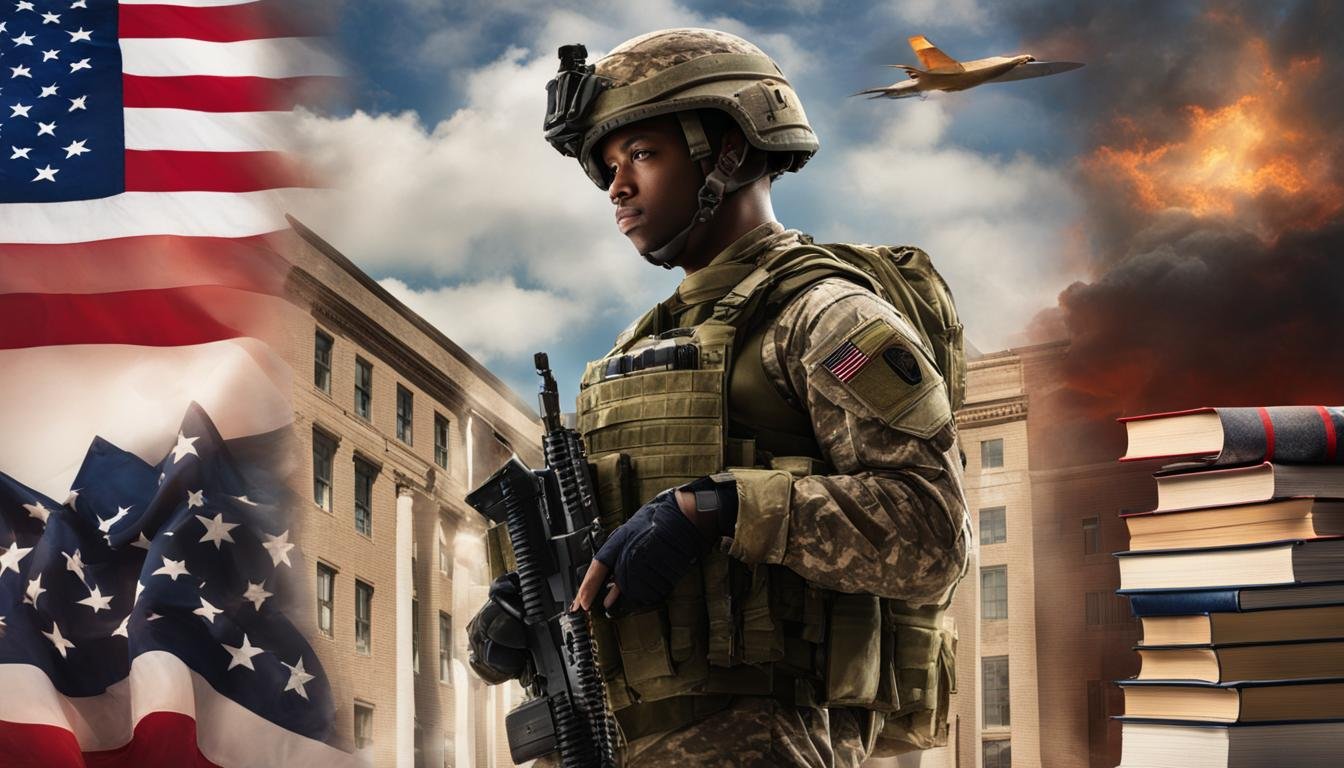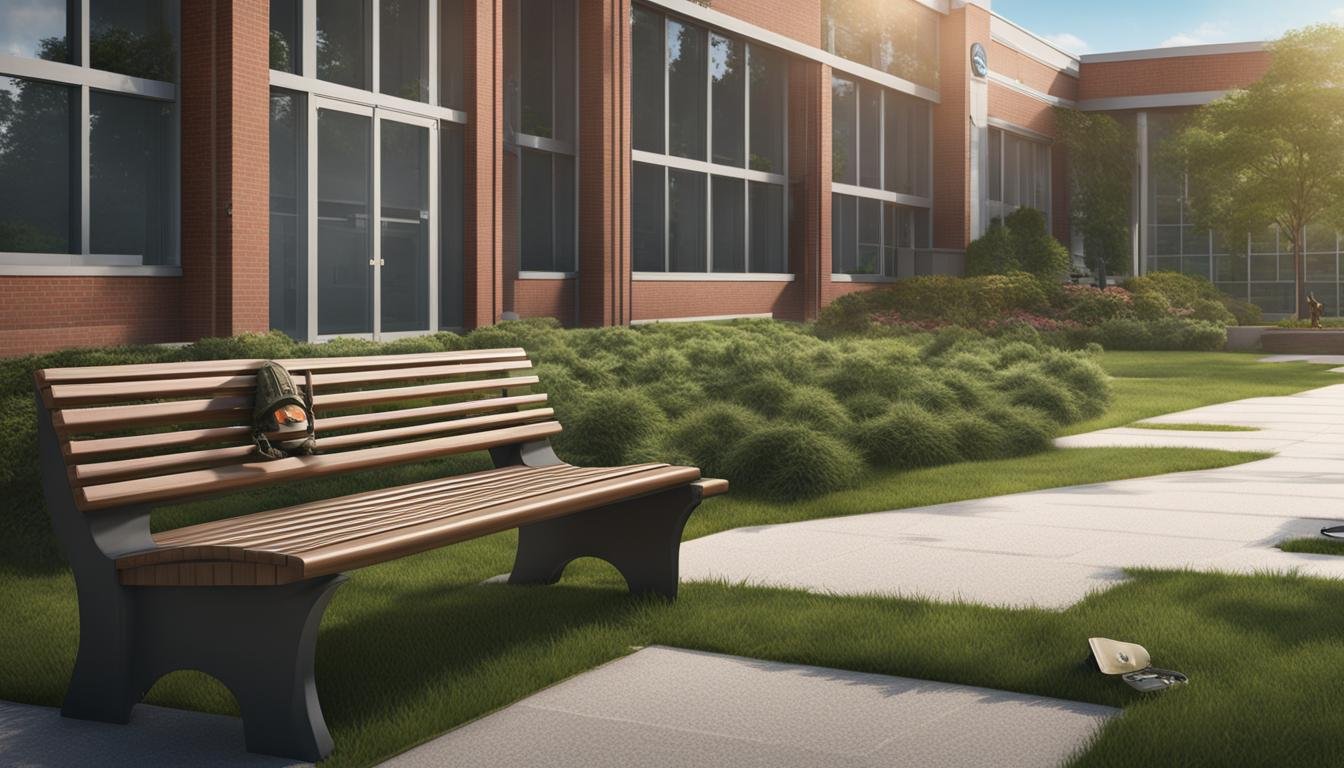Embarking on the journey of transitioning from military to college life is an ambitious undertaking that calls for guidance tailored to your unique circumstances. As veterans, you have acquired a wealth of skills—discipline, organization, time management, and attentiveness—that provide you with a distinct advantage in the academic realm. This comprehensive guide is designed to furnish you with invaluable advice for veterans transitioning to college life, ensuring that your military to college transition is as seamless and successful as possible.
Securing a post-service education is not just a goal; it’s an opportunity that has been made more accessible thanks to resources such as the Post-9/11 GI Bill® and the Forever GI Bill®. These benefits open up avenues for you to broaden your horizons and achieve your academic aspirations. It’s your time now to step into a new chapter of life with the full knowledge and preparation needed to navigate this significant transition.
Transitioning from Military to College Life – Key Takeaways
- Utilize your military-honed skills for academic success in college.
- Understand and take full advantage of the educational opportunities offered by the GI Bills®.
- Identify and access the support systems available to ease your college transition.
- Face the challenge of adjustment proactively by tapping into resources for veterans.
- Acknowledge the importance of battling the stigma associated with seeking support.
- Prepare to manage the social and academic aspects of college as you integrate into campus life.
Recognizing Your Military Service as an Academic Strength
Your journey from a disciplined military environment to the dynamic world of college can be a pathway paved with academic success, courtesy of the invaluable skills learned in service. Leveraging military experience in college applications gives you a commanding presence among prospective students, shaping the landscape of your educational journey.
Leveraging Skills Like Discipline and Time Management
Military discipline and college academic success align more closely than many realize. The rigorous discipline cultivated in the military transforms into exceptional organization and an unyielding dedication to academic tasks within the college setting. Meanwhile, superior time management skills, shaped on the front lines, translate seamlessly into managing study schedules, project deadlines, and the many competing priorities of college life.
Your military discipline is more than a personal trait; it’s an academic toolset waiting to be harnessed.
Understanding the Value of Military Training
The years spent in military service are replete with transferable skills that have significant academic and career value. Skills such as quick decision-making, leadership, and the ability to thrive under pressure not only facilitate a smooth transition but also set you ahead in the competitive college environment. Recognizing leadership skills from the military in college showcases your readiness to tackle advanced studies and complex group projects.
Maximizing Your Military Experience in College Applications
Integrating military training with college studies begins with the college application process. When you articulate your experiences—be it tactical proficiency, strategic planning, or interdisciplinary teamwork—you demonstrate real-world application of knowledge that can influence your college major choice and educational outcomes.
- Highlight how military experiences compel you to strive for excellence.
- Illustrate your capacity for leadership through past responsibilities.
- Explain how transitioning military skills to college projects offers unique insights.
Colleges are continuously seeking candidates who are not just academically proficient but are also rounded individuals ready to contribute to campus life. Your military background is a testament to this.
| Military Skill | Academic Application | Potential Impact |
|---|---|---|
| Adaptability | Agility in responding to academic challenges | Improved problem-solving efficacy |
| Problem-solving | Approaching projects with strategic thinking | Enhanced project outcomes |
| Leadership | Guiding group projects and discussions | Leadership roles in academic and extracurricular activities |
| Technical Skills | Application of practical experience to coursework | Increased hands-on experience and practical knowledge |
Remember, the skills you’ve refined in uniform are now your most powerful academic assets. As you venture into college life, carry these strengths with pride and confidence knowing they will underpin your success.
Exploring Veteran Support Systems in College
As you embark on the next chapter of your life, it’s essential to know that there are numerous resources for military to college transition designed to support you. These resources contribute to a veteran-friendly campus environment and are equipped to handle a variety of needs that may arise during your academic journey.
From academic counseling, financial aid guidance, to mental health services, these support services for veteran students are pivotal in creating a supportive and understanding college atmosphere. More than mere amenities, they represent a bridge between military service and college education, and this transition is crucial for your success.
Understanding the need to translate your hard-earned military skills to the academic setting, programs like the Warrior-Scholar Project and National Association of Veterans Upward Bound (NAVUB) offer workshops and educational support designed specifically for veterans. These initiatives provide substantial groundwork to ensure you make the most of what colleges have to offer.
Transitioning your discipline, leadership, and problem-solving skills into academic strengths will set you up for college success.
Here’s an outline of the support services on campus that you can benefit from:
- Academic Counseling: Advisors who understand the veteran’s perspective and can guide academic and career choices.
- Career Services: Aiding in the translation of military skills into the civilian job market.
- Tutoring Programs: Personalized academic assistance through one-on-one sessions.
- Study Groups: Opportunities to collaborate and learn with peers, fostering a strong community feeling.
- Health and Wellness: Medical and psychological support tailored specifically to veteran students.
- Financial Aid Guidance: Assistance in navigating the GI Bill® benefits and other financial opportunities.
Additionally, the very community of veterans on campuses across the country contributes to a network of support, both collegiate and social. Through organizations on campus or programs that connect you virtually, coming together with other veterans eases the collective passage from military to college life.
| Program | Benefits | How to Access |
|---|---|---|
| Warrior-Scholar Project | “Boot Camps” focused on preparing veterans academically | Directly through military or partnered colleges |
| National Association of Veterans Upward Bound | Educational counseling and career development | Through NAVUB-partnered institutions or the Department of Education |
| On-Campus Veteran Resource Centers | Information, assistance, and camaraderie among college veterans | Available at most military-friendly institutions |
| Student Veterans of America | National network providing advocacy and resources | Through joining a campus chapter or the national organization |
By tapping into these vetted resources and communities tailor-made to support your unique experiences, you can navigate the complexities of transitioning from military to college with confidence and support.
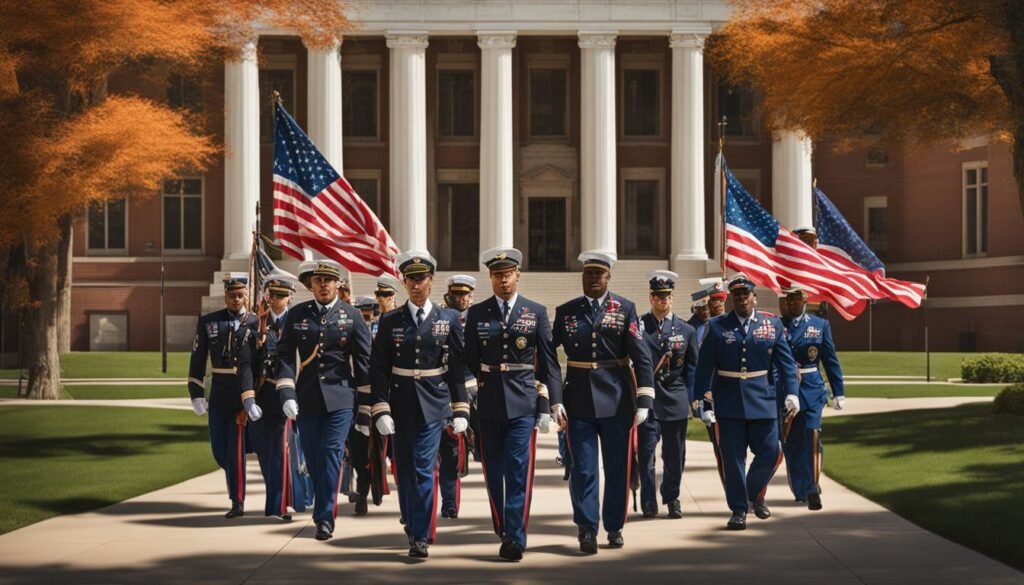
As you stand at the precipice of change, preparing for academic life after military service, it’s crucial to set forth with a clear plan. Formulating and setting academic and career goals not only gives your pursuits direction but also becomes the backbone for all your academic decisions moving forward.
Setting Academic and Career Goals
Consider what you wish to achieve in both your education and professional sectors. It’s vital to align your goals with your interests, the knowledge you attained during your service, and the kind of career you envision post-graduation.
- Identify your areas of interest and the types of roles that would motivate you.
- Evaluate educational requirements for jobs in your desired field.
- Consider how a specific college degree will enhance your career opportunities.
- Map out the location where you’d prefer to live and work, taking into account the job market.
Educational aspirations are deeply personal, but they require a structured approach to be realized. There’s no one-size-fits-all methodology; as a veteran, your journey is unique, and so should be your goals.
Begin with the end in mind – know what you’re working towards to optimize your path from military to college to career.
Selecting Veteran-Friendly Colleges for Your Transition
When selecting veteran-friendly colleges, delve into research and identify institutions that not only offer quality education but also understand and value your military service. Look for colleges that offer robust college support services for veterans and navigate military benefits skillfully during your college transition.
| Features of Veteran-Friendly Colleges | How They Support Your Transition |
|---|---|
| Recognition of Military Training for Credits | Maximizes your past experiences by transferring them into academic credits. |
| Robust Financial Aid Programs | Provides a clear understanding of your military benefits and aids in the application process. |
| Active Campus Veteran Community | Offers a network of peers who understand the nuances of transitioning from military to academic life. |
| Specialized Academic and Career Resources | Caters to the distinctive needs of veteran students in preparing for careers post-degree. |
| Dedicated Veteran Support Services | Ensures smooth assimilation through counseling, tutoring, and mentorship programs. |
Knowing how to leverage your service experience is key when you’re navigating college admissions. Understanding your GI Bill® benefits, mapping potential career paths, and selecting the right institution are essential steps in translating military acumen into academic and career success. Armed with a strategy, you can confidently approach this new chapter in your life.
Adjusting to College Campus Life as a Veteran

Entering college as a veteran often entails embarking on a journey through uncharted educational landscapes, a journey that requires not only mental preparation but also the right resources for veterans college adjustment. Recognizing the significant shift from military to academia, you might find college campus adjustment for military veterans to involve navigating new social norms and finding your place within the college community. This transition is a pivotal phase in your educational endeavor and taking steps towards social integration tips for veterans in college is crucial.
Once you step onto campus, you may encounter peers or professors with little to no understanding of the military life you’ve lived. While this gap in experience can feel isolating, it also presents an opportunity to bridge that divide through patient explanation and interaction.
Don’t let differences become barriers: your military background provides you with a unique perspective that can enrich the college experience, both for yourself and for your peers.
Seeking community with other veterans on campus can also offer the camaraderie that eases the transition. Many colleges host veterans’ groups where you can share experiences, find support, and foster meaningful connections with those who can relate to your background.
| Challenge | Strategy | Resource |
|---|---|---|
| Lack of Understanding from Peers | Share Your Experience | Peer Mentoring Programs |
| Navigating New Social Norms | Attend Social Integration Workshops | Campus Counseling Centers |
| Connecting with Like-Minded Veterans | Join Veterans’ Clubs | Student Veterans of America Chapters |
| Finding an Academic Community | Participate in Study Groups | Veteran Academic Support Centers |
Remember that your voice adds a vital layer to the tapestry of diverse thoughts and ideas on campus. Embrace your identity as a veteran and explore the various avenues that await you, knowing that your military experience has provided a firm foundation for this new phase of your academic journey.
- Locate the veterans center on your campus as a starting point for support and resources.
- Engage in open dialogue with your classmates to foster mutual understanding and respect.
- Establish connections with faculty who can provide guidance and an empathetic ear.
- Explore the extracurricular activities available to broaden your college experience.
Finding comfort on a college campus is a process. It requires resilience and an openness to adapt, but also taking advantage of the support systems in place. Your journey from military to college life is one of transformation, and with the right strategies, you’ll find your path to becoming an integral part of your new academic community.
Utilizing GI Bill Benefits for Academic Advancement
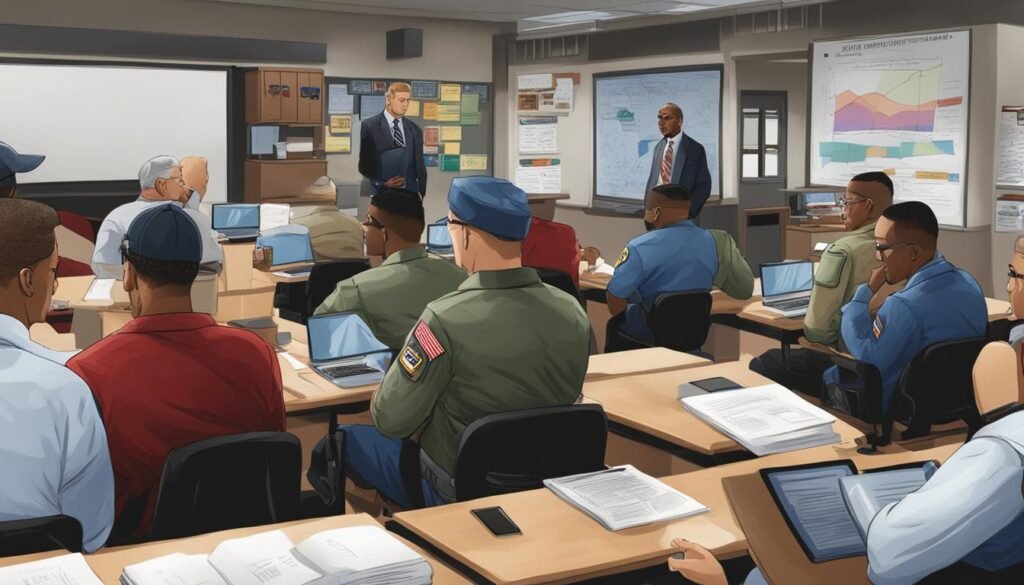
The transition from military to civilian life is a defining moment, and understanding the Post-9/11 GI Bill is a pivotal stepping stone in your journey. With the comprehensive coverage of the Forever GI Bill, your pursuit of higher education becomes not just a possibility, but a probable reality. As you’re navigating college financial aid, these bills serve as cornerstones to funding your academic ambitions. Let’s decipher these benefits and navigate through the additional financial aid landscape to set you squarely on the path to your educational goals.
Understanding the Post-9/11 GI Bill and Forever GI Bill
Navigating VA services as a college student can seem overwhelming, but armed with the right information, you can unlock the full potential of the Post-9/11 GI Bill. The bill provides financial assistance for tuition and fees, a monthly housing allowance, and a stipend for textbooks and supplies. Moreover, the Forever GI Bill has expanded these benefits, eliminating the 15-year expiration for veterans discharged after January 1, 2013, amongst other enhancements.
Take hold of the education benefits earned through your service to reap the rewards in your post-military life.
While the GI Bills provide robust support, don’t overlook additional financial aid opportunities. Navigating college financial aid involves a proactive search for scholarships, grants, and the Free Application for Federal Student Aid (FAFSA), critical aspects of financial aid advice for veteran college students. These resources can supplement your GI Bill benefits, ensuring a smoother financial journey through college without the looming shadow of debt.
- Apply for FAFSA to unlock federal grants and loans.
- Research scholarships specifically for veterans and service members.
- Understand eligibility for service-specific financial resources.
- Explore institutional aid offered by the college or university you attend.
By strategically combining your GI Bill benefits with these additional forms of aid, you’re setting a course for financial security as you navigate the responsibilities of military and college commitments.
| Benefit Source | Resources Covered | Action Steps |
|---|---|---|
| Post-9/11 GI Bill | Tuition, Housing, Books | Verify eligibility, apply via VA website |
| Forever GI Bill | Tuition, Housing, Books, Additional Certifications | Assess expanded benefits, consider further education or training |
| Federal Aid (FAFSA) | Tuition, Potential Grants and Loans | Submit FAFSA annually, explore grant eligibility |
| Scholarships | Tuition and Academic Expenses | Research various scholarships, apply diligently |
| Institutional Aid | Tuition, Special Programs | Consult with financial aid office, review institution-specific opportunities |
As you advance on your academic path, leverage these benefits and opportunities to minimize out-of-pocket expenses. The GI Bill benefits are designed to support you, as a veteran, in this new chapter, ensuring that the path to academic enlightenment is both accessible and rewarding. Embrace this financial assistance as recognition of your service and commitment to our nation, and let it propel you to new heights in your educational pursuits.
Identifying and Overcoming Academic Challenges
As you transition from active duty to college student, it is common to encounter hurdles that seem daunting when adjusting to college academics as a veteran. The learning environment in higher education often contrasts sharply with the tactical training you are accustomed to, which can present a set of academic challenges unique to your experience.
Identifying these challenges early and seeking the appropriate resources is crucial. Utilizing resources such as tutoring services and academic advising is an effective way to not only overcome these barriers but to also translate your military skills into academic success.
Success in college relies on your ability to adapt and overcome. Your military experience has uniquely equipped you to handle the unexpected; use it to your advantage in the classroom.
- Understand the Academic Expectations: College coursework can differ greatly from military training. Familiarize yourself with the syllabus and academic requirements of each class to stay on track.
- Build a Support Network: Connect with fellow veteran students and professors who can provide insight and guidance as you navigate your new academic landscape.
- Embrace New Learning Styles: Be open to different methodologies of instruction and find techniques that work best for you, such as visual aids or interactive discussions.
Below is a table highlighted with specific academic challenges that veterans often face, along with strategies and resources to help you overcome these obstacles.
| Challenge | Strategy | Resource |
|---|---|---|
| Time Management | Use organizational skills developed in the military to create a study schedule | Campus time-management workshops |
| Adapting to Classroom Settings | Engage in class discussions to get comfortable in a new environment | Study groups and class participation |
| Understanding Academic Writing | Seek feedback on assignments to improve writing skills | Writing Center and English tutoring sessions |
| Stress of Exams | Prepare in advance with consistent review sessions | Academic counseling services |
| Cultural Assimilation | Connect with campus clubs and participate in social events | Veteran associations and international student centers |
Remember, your journey at this college is a marathon, not a sprint. Challenges are a natural part of transitioning into a new phase of life, and it’s important to apply the same perseverance and tenacity that served you well in the military. Whether it’s developing new study habits or seeking academic assistance, the key is to stay proactive and use the resources your college offers to support your academic endeavors.
In the pursuit of academic success, take pride in the strengths you bring as a veteran. The discipline, leadership, and teamwork you’ve demonstrated in service are invaluable assets in your education. With the right strategies and support, you’re well on your way to not just overcoming academic challenges but excelling in them.
Engaging with Fellow Veterans and Building a Community
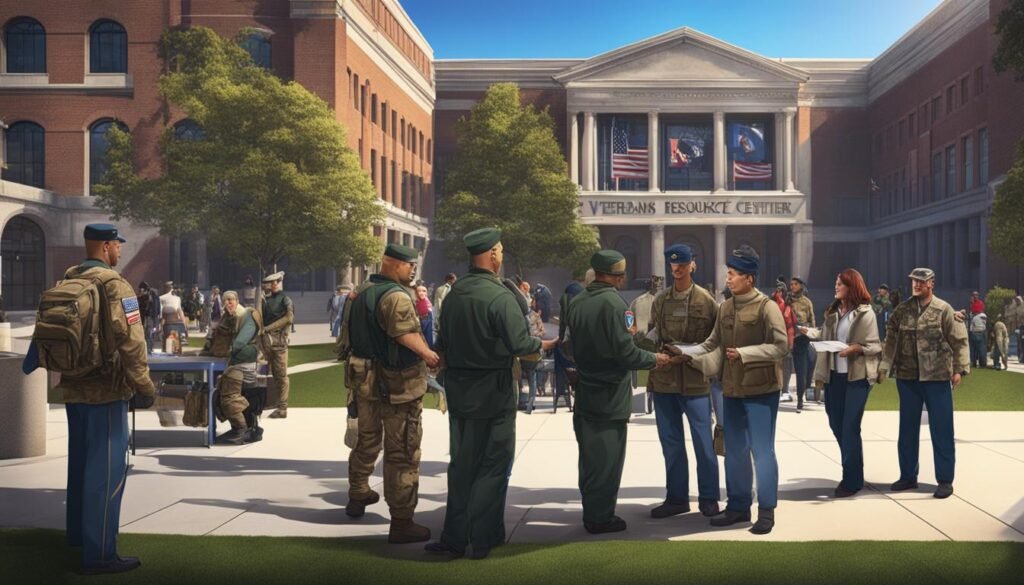
Transitioning to college life brings a new set of challenges and opportunities. As a military veteran, you have the unique advantage of being able to engage with fellow veterans in a college setting. This can lead to creating a robust support network that is both comforting and invaluable to your college experience.
Building a community in college is pivotal. It helps you integrate into a new world while maintaining a link to the camaraderie and fellowship you’re accustomed to. As you step onto campus, seek out organizations and clubs where veterans gather, as these can become havens of mutual understanding and shared experiences.
Recognizing the immense value in these connections, colleges often house chapters of national organizations like Student Veterans of America (SVA) that are aimed at helping you build those relationships and access the support you need. These groups are instrumental in finding mentorship and networking opportunities for military veterans, which can greatly enhance your college and professional trajectory.
Finding Mentorship and Networking Opportunities on Campus
Mentorship often begins within your campus’s veteran community. Networking in college for military veterans is about more than making acquaintances; it’s about forging bonds with those who can guide and assist you as you navigate your new academic endeavors. They can share not only academic advice but life advice that resonates with your unique experiences.
A mentor can be a fellow student veteran who’s further along in their studies, a faculty member who is also a veteran, or alumni who have treaded a similar path. These relationships can lead to both personal growth and professional opportunities, particularly as veterans’ networks tend to be both tight-knit and expansive.
Seeking out networking opportunities creates a fabric of resources and peer support instrumental to your success.
Here are some steps you can take to find your veteran community and network on campus:
- Visit the veteran affairs office or resource center on campus to get connected with veteran groups and events.
- Look for SVA chapters or similar organizations and attend their meet-ups and activities.
- Approach your college’s career services office to learn about veteran-centric networking events and workshops.
- Engage in social media groups and online forums dedicated to veteran students at your school.
By actively seeking out these communities and resources, you’re taking a proactive approach to finding support throughout your academic journey. Remember, you’re not alone in this transition, and there are networks ready and willing to welcome you into the fold.
| Resource | Type of Support | How They Facilitate Networking |
|---|---|---|
| Student Veterans of America | Community and Advocacy | SVA chapters provide a platform for veterans to connect and engage with one another, offering events, peer mentorship opportunities, and professional development. |
| Campus Veteran Centers | Academic and Social Support | These centers serve as a hub for veteran activities, information, and resources that contribute to the academic success and mental well-being of student veterans. |
| Career Services | Professional Development | Career services can connect veterans with job fairs, internships, and employment opportunities specifically aimed at the veteran population. |
| Faculty Veteran Advisors | Mentorship | Veteran faculty members can offer one-on-one guidance and support, helping to navigate college life and career after graduation. |
Your pursuit of education as a veteran is commendable. It’s a journey that will be enriched by the communities you build and the networking you engage in. Taking these steps to connect and integrate can significantly lessen the learning curve of transitioning from military to college life and open doors to future career success.
Handling Cultural and Social Differences in College

As you step into the vibrant ecosystem of academia, you might find cultural integration in college to be one of the transformative experiences that define your student life. For veterans navigating college social life, this represents an opportunity to broaden horizons beyond the structured discipline of military service and engage with a diverse community of thinkers and learners.
The tableau of college life is painted with a multitude of social expectations and cultural norms that may be unfamiliar. As you interact with fellow students from a spectrum of backgrounds, open-mindedness and communication are your stalwarts in handling cultural and social differences.
“Embrace diversity as a gateway to enriching your worldview, fostering personal growth through exchanges that challenge and enlighten.”
Your military background has provided you with unique experiences that can contribute to the campus dialogue, enriching the educational environment for everyone. It is not uncommon, however, to feel out of step with peers who may have taken a more direct path to college. Fostering understanding and finding common ground will become invaluable as you make strides in social integration.
Here are some tangible steps to aid you through this transition:
- Engage in campus events that celebrate cultural diversity to gain perspective.
- Join clubs or groups that align with your interests, as these can serve as a platform for cultural exchange.
- Participate in open discussions to bridge the gap in understanding and experiences.
- Consider enrolling in courses focusing on cultural studies to enhance your knowledge.
The following table provides an overview of the experiences you may encounter and strategies to navigate these encounters:
| Experience | Encounter | Strategy |
|---|---|---|
| Classroom Dynamics | Diverse perspectives in discussions | Listen actively, contribute thoughtfully, respect different viewpoints |
| Group Projects | Collaboration with students of various backgrounds | Utilize your leadership skills to foster group cohesion and productivity |
| Social Events | Casual interactions and networking | Show curiosity about others, share your experiences when appropriate |
| Cultural Celebrations | Exposure to traditions and customs | Participate to learn and show respect for other cultures |
Keep in mind that every interaction is a learning opportunity. Handling cultural and social differences is not just about adapting but also about contributing. You bring a rich tapestry of experiences to the college community, which is ripe for sharing.
Remember, college is a melting pot where the veteran perspective is not just welcomed but needed. It’s an integral part of the collective growth that a pluralistic educational setting can offer. With a bit of effort, you can translate the camaraderie you knew in the service into a new fellowship of students, one that is anchored in diverse cultural and social understandings.
Seeking Mental Health Support and Resources
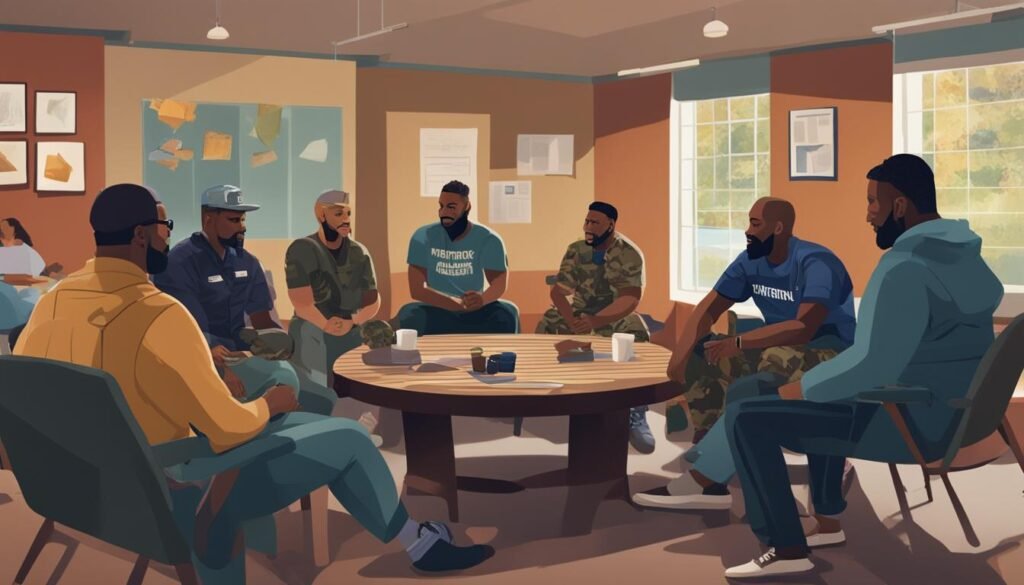
Navigating the passage from military service to college can surface challenges that touch upon various aspects of mental wellness. Veterans and active-duty military in college may find themselves encountering unexpected emotional hurdles, and seeking mental health support is a crucial and strength-oriented step in addressing these challenges. From utilizing on-campus counseling to accessing veteran-specific mental health programs, a range of services is available to foster your well-being and success in the academic environment.
Utilizing On-Campus Counseling and Crisis Services
Utilizing on-campus counseling services can provide immediate support for veterans adjusting to college life. Most college campuses are equipped with counseling centers that offer services tailored for a variety of mental health issues, including stress, depression, and anxiety. These centers often provide individual therapy sessions, group counseling, and crisis intervention services. It’s vital to know that it’s not uncommon for resource demand to exceed supply, leading to capacity issues. Nevertheless, on-campus counselors understand the unique pressures veterans face, and they can become an indispensable part of your support network.
Proactive engagement with mental health services is not just a response to crisis; it’s a strategic tool for maintaining well-being.
Accessing Veteran-Specific Mental Health Programs
Beyond the campus services, numerous mental health resources for veterans in college are accessible and cater to the unique experiences of veterans. The Department of Veterans Affairs (VA) has established several initiatives to address the specific mental health needs of veterans, providing services like readjustment counseling and emergency mental health care.
- Vet Centers offer community-based counseling centers focusing on the readjustment needs of veterans.
- The Veterans Crisis Line is a resource for confidential immediate support, standing by 24/7.
- Organizations such as Give an Hour partner with academic institutions to offer free mental health services to veterans and their families, helping to bridge potential gaps in care.
If you are seeking support for active-duty military in college, it’s essential to touch base with these veteran-centric programs that can vastly contribute to your mental health and academic success.
| Service | Provided Support | How to Access |
|---|---|---|
| Vet Centers | Readjustment counseling and outreach services | Contact your local Vet Center or visit the VA website |
| Veterans Crisis Line | Immediate crisis support via call, text, or chat | Call +1 (800) 273-8255, Text 838255, or Chat Online |
| Give an Hour | Free mental health care | Register through the Give an Hour website or associated University program |
Undoubtedly, addressing mental health is an integral part of the college experience for veterans. As you maneuver through the academic landscape, remember that mental health services for veterans in college are not just available—they are a right that you have earned through your service, designed to support your health and enhance your capacity for success.
Balancing Educational Commitment with Family and Work
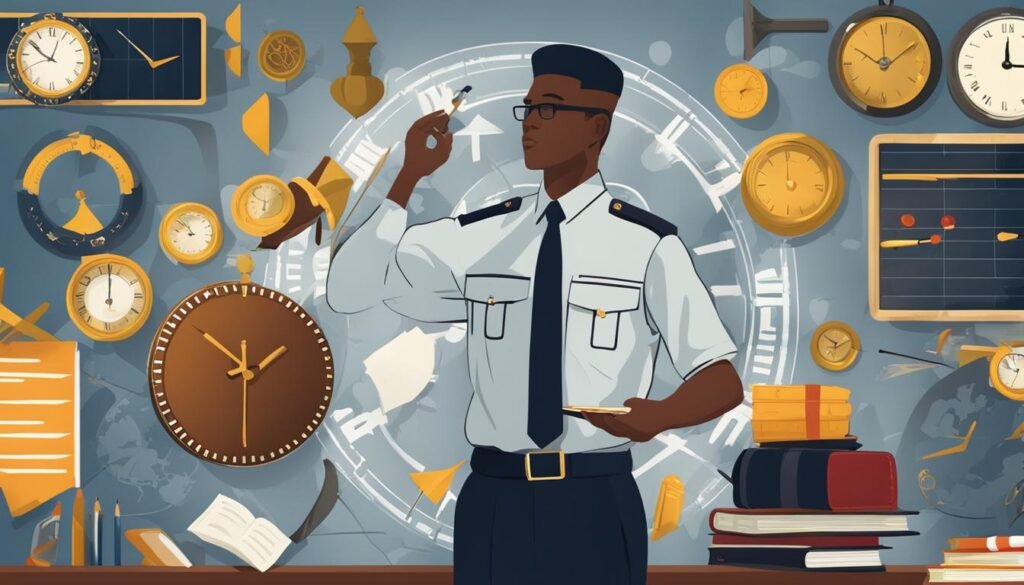
As a veteran, striking a balance between family, work, and college is often a daily challenge. Juggling military duties and college coursework alongside familial responsibilities requires a robust plan and effective time management strategies for military college students. This section provides strategies to help you maintain this delicate balance, ensuring success in every sphere of your life.
Setting priorities is fundamental. Decide which commitments are non-negotiable and which can be more flexible. Here’s how to create a priority list that resonates with balancing family, work, and college for veterans:
- Assess each area of your life and the time each commitment requires.
- Recognize the times of day you are most productive and allocate them to your studies.
- Communicate clearly with your family and employer about your academic schedule.
- Ensure time is reserved for personal care and family, as they are as crucial as your professional and academic goals.
Striking a balance doesn’t mean doing everything at once; it means aligning your tasks to your life’s rhythms and values.
Maintaining strong organizational skills can help mitigate the pressures of a packed schedule. Here are some actions you can take:
- Use a planner or digital calendar to track all deadlines and commitments.
- Plan weeks ahead, allocating time blocks for studying around family and work responsibilities.
- Regularly review and adjust the plan as necessary, maintaining flexibility.
Exploring flexible learning options such as online courses or part-time programs can also provide the adaptability needed for veterans managing multiple roles. Consider the following:
- Choose programs that understand and accommodate the complexities of your life as a veteran.
- Take advantage of online resources and recorded lectures to stay on course.
- Look for institutions that offer evening or weekend classes if you need to maintain daytime commitments.
Finally, seek guidance from academic advisors who can assist in managing a feasible course load. Their expertise can help you:
- Understand the optimal number of units per semester considering your personal circumstances.
- Identify support services offered by the college for veterans.
- Create a degree plan that aligns with your long-term career and family goals.
| Challenge | Strategy | Resource |
|---|---|---|
| Time Management | Organize tasks by priority and use time-blocking techniques. | Planners, digital calendars, productivity apps |
| Flexible Learning | Enroll in online courses or programs with non-traditional schedules. | Distance learning platforms, evening/weekend programs |
| Course Load Management | Work with academic advisors to develop a balanced schedule. | College veteran affairs or student services office |
| Family Involvement | Engage family members in the planning process. | Family meetings, shared digital family calendars |
In pursuing your educational goals, remember to leverage the time management strategies for military college students acquired during your service. Efficiently balancing family, work, and college as a veteran is within reach, and by implementing these strategies, you’ll navigate the journey with greater ease and success.
Final Thoughts
Embarking on the journey of transitioning from military to college life is a testament to your resilience and commitment to personal growth. Whether you’re seeking to expand your knowledge, advance in your career, or simply embrace a new chapter, the transition brings with it a unique set of challenges and opportunities. The foundation you built while serving in the military is a powerful asset as you integrate into the academic community and harness military to college transition programs designed to facilitate your success.
Victories in this new domain are achieved by proactively engaging with support networks, accessing financial aid, and connecting with peers who understand your journey. Your ability to adapt, overcome adversities, and build upon your experiences are hallmark traits that will guide you. Transitioning from military to college life is not without hurdles, but with the wealth of resources at your disposal, you are well-equipped to navigate and triumph over these challenges.
As you write the next chapter of your story, remember that the skills, discipline, and inner strength that served you well in uniform now lay the groundwork for academic achievements and enriching collegiate experiences. Your proactive approach in overcoming challenges in the military to college transition will set a precedent for fellow veterans and inspire future generations to boldly pursue their post-military aspirations.
Transitioning from Military to College Life – Frequently Asked Questions (FAQs)
Is it hard to go to college after the military?
The transition from military to college can certainly present challenges. However, with proper planning and support, many veterans find success in academia. Identifying your interests, career goals, and ideal learning environment can help you choose the right school and program. Connect with on-campus veterans services and peer mentors for guidance on navigating college life. Take advantage of counseling to handle stress and maintain your health and wellness. With commitment and resilience, you can overcome obstacles and achieve your higher education goals.
How do you transition from military to college?
The shift from military to college requires both practical preparation and mental adjustment. First, research schools and identify programs matching your interests and career aspirations. Determine eligibility for veterans education benefits like the GI Bill to fund your studies. Apply for financial aid and scholarships to supplement costs. Reach out to admissions counselors knowledgeable about assisting veterans. Once enrolled, connect with academic advisors to create a course plan. Attend new student orientation and join student veterans groups to build community. Use time management and study skills learned in the military to develop an effective routine. Be open to seeking academic assistance and mental health services when needed. With planning and support, the transition can be manageable.
Is transitioning out of the military hard?
Leaving military service brings major life changes that can be challenging. Adapting to a less structured civilian lifestyle can be an adjustment. Some veterans struggle with isolation, mental health issues like PTSD, and translating military skills to college or the workforce. Creating a plan for your education and career path early on helps ease the transition. Maintain military friendships and utilize veteran services on campus for support. Focus on your strengths gained from military training like discipline and teamwork. View this new chapter as an opportunity for personal growth and development. With resilience and support, the difficulties of transition can be overcome.
Does being in the military make it easier to get into college?
Colleges value the real-world experience, skills, and perspective veterans bring to campus. Many schools have dedicated admissions counselors to assist veterans and may provide application fee waivers. Your military training shows time management, leadership, and ability to complete complex tasks useful for academic success. Vocational skills and foreign language abilities gained during service may also earn college credits through prior learning assessments. Emphasize your motivation, focus, and teamwork in applications. Overall, your military background helps demonstrate you have the capability to excel in higher education.
What Support Services are Available to Veteran Students during their Transition to College Life?
There are various veteran student support services available to aid their transition to college life. These services encompass academic guidance, career counseling, mental health support, and specialized resources. These support systems strive to ensure a smooth adjustment to the college environment and provide the necessary assistance for veterans to thrive academically and personally.
Is joining the military worth it for college?
Military service can make college more affordable but requires great personal sacrifice. Education benefits like the GI Bill provide thousands in tuition assistance with additional housing stipends. However, you must complete an enlistment contract, delaying college by at least two years. Consider your career interests, financial needs, and willingness to serve before joining solely for college funds. Compare all options like scholarships, aid, and loans to make the best choice for your goals. For some, military service provides invaluable skills, training, and funding for higher education.
What are the Challenges of Balancing Military Service with College Life?
Finding a balance between college and military life can be incredibly challenging. Juggling coursework, exams, and military commitments requires meticulous planning and effective time management. Meeting both academic and military expectations can be overwhelming, often leading to sacrifice in areas such as social life and personal well-being. However, with proper organization and support systems in place, it is possible to conquer these challenges and succeed in both realms.
Is it worth joining the military before college?
Joining the military directly out of high school has advantages but also drawbacks to weigh. You can gain world experience, vocational skills, financial benefits, and maturity before college. However, you may struggle transitioning back to academics and campus life later on. You’ll delay earning your degree and entry into a civilian career. Consider whether you need funds for college or want to directly pursue a career requiring a degree first. While the military can help pay for school, know it requires a major commitment. Focus on your career interests and personal goals to decide if enlisting is the best path forward.

